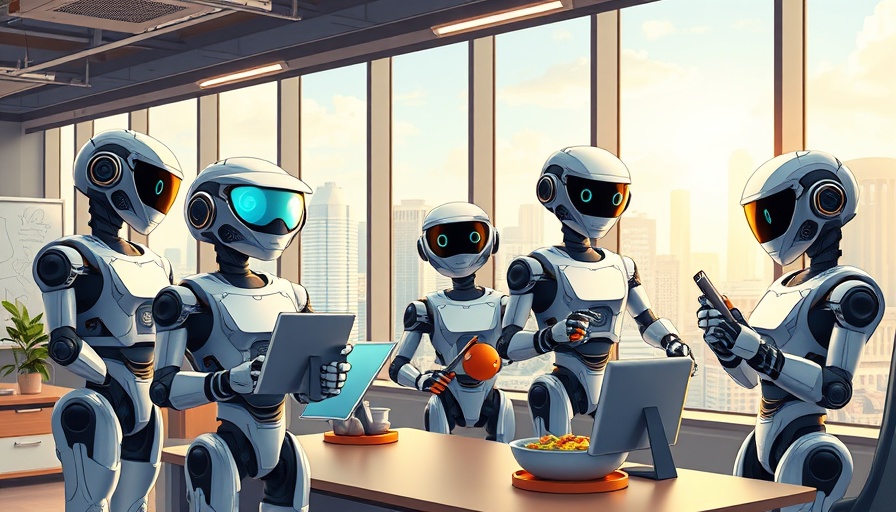
The Shift from Assistant to Agentic AI: A New Era in the Workforce
The conversation surrounding artificial intelligence (AI) and its impact on the job market has intensified recently as we enter a transformative phase known as the agentic era of AI. Unlike previous iterations where AI served primarily as assistants, the current developments suggest that AI agents are now equipped to perform a broader range of tasks, potentially replacing entire job categories previously held by humans. This leads us to the pivotal question: what new roles will emerge in this shifting landscape?
In '20+ New Jobs that AI Will Create', the discussion dives into the transformative effects of AI on the job market, exploring key insights that sparked deeper analysis on our end.
Companies Bracing for Change: Insights from Industry Leaders
The memo from Amazon's CEO Andy Jassy articulates the urgency of adapting to this evolving workforce. Jassy predicts a decrease in Amazon's total headcount as the company increasingly relies on AI agents, emphasizing that while some jobs will be lost, new ones will arise—jobs that focus on integrating, managing, and enhancing AI capabilities in the workplace.
Similarly, Robert Smith, CEO of Vista Equity Partners, anticipates that nearly half of workers at influential conferences will soon have AI agents at their disposal, which implies a significant transition toward automation that could leave many job seekers scrambling for new optimal pathways. This wave of technological evolution is not just about replacement; it aims to redefine what work means, enhancing efficiency and potentially increasing job satisfaction for those who adapt.
Examining New Opportunities: What Roles Will AI Create?
The New York Times recently published an article detailing 22 potential new job roles emerging from AI advancements. These roles bridge the gap between AI's capabilities and human needs. Some of the highlighted positions include:
- AI Auditor: Ensuring transparency and accountability in AI decision-making.
- AI Personality Director: Crafting the personality traits of AI interfaces to align with company brands.
- Drug Compliance Optimizer: Developing systems in healthcare that ensure patients adhere to their medication schedules.
- AI Trainer: Preparing AI to navigate and utilize a company’s data effectively.
- Consistency Coordinator: Ensuring uniformity in outputs across various AI systems.
These roles highlight the increasing need for human oversight even as AI takes on more responsibility. The focus will shift from performing rote tasks to strategically managing AI and harnessing its capabilities.
Future Predictions: Navigating the Transition
As we look ahead, it is vital to derive insights from this transformative period. While economic losses due to AI will likely overshadow new job growth in the short term, proactive engagement with these technologies can mitigate risks and uncover opportunities. Business owners are urged to start integrating AI into their operations now; doing so will not only provide them with a competitive edge but also foster an adaptable workforce prepared for the challenges of tomorrow.
Actionable Insights for Business Owners
To prepare for an AI-driven landscape, here are several actionable steps:
- Embrace AI Tools: Explore available AI tools and assess their applicability to your business operations.
- Reskill Employees: Provide training for current staff on AI technology to ensure they evolve alongside these innovations.
- Seek Feedback: Foster a culture of open dialogue about AI integration within your workforce to ease concerns and drive acceptance.
- Collaborate with Experts: Bring in AI specialists to facilitate the implementation of effective solutions.
By taking these proactive measures, business owners can ensure their organizations are not just surviving but thriving in an AI-enhanced future.
Conclusion: Start Using AI Now to Stay Competitive
In conclusion, as we explore the promising yet uncertain terrain of AI's influence on the job market, it is critical to recognize the new opportunities arising amidst the challenges. By adapting now, business owners can safeguard their positions and help shape a future where AI complements human work rather than replaces it. Don’t wait—begin your journey with AI today to stay ahead of the curve and unlock the full potential of this game-changing technology.
 Add Row
Add Row  Add
Add 




Write A Comment